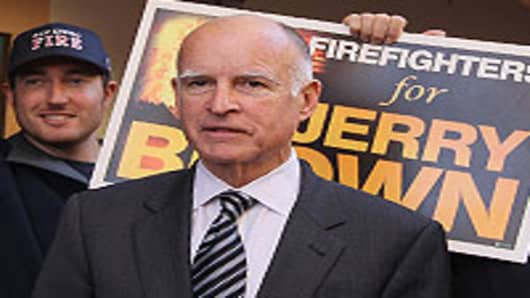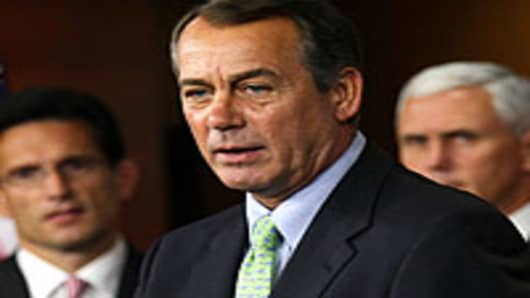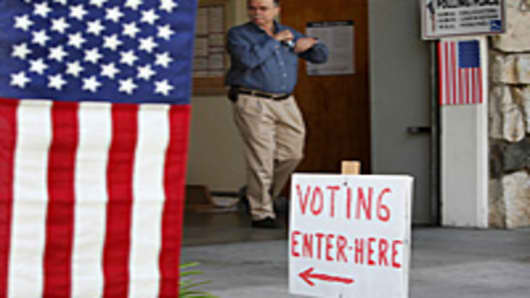Republicans will win enough seats to take control of the House but not the Senate, NBC News projected, creating a divided Congress and a major blow to President Obama's agenda.
Senate Democratic Majority Leader Harry Reid won re-election in Nevada against Republican Sharron Angle in a tight race, NBC also projected.
Republicans had targeted Reid and poured millions of dollars into Angle's campaign, which was also backed by the conservative Tea Party group.
In key victories for Democrats, three-term Senator Barbara Boxer will hold on to her seat in California, defeating Republican challenger and former Hewlett-Packard chief Carly Fiorina.
Along with a win by Democrat Joe Manchin in the race for the late Senator Robert Byrd's West Virginia seat, Democrats will hold at least a slender Senate majority.
And in California, Democrat Jerry Brown was elected governor, defeating Republican Meg Whitman, former CEO of eBay.
Still, in another blow to Obama, Illinois Republican Mark Kirk won the president's former Senate seat that was left vacant by appointee Roland Burris. Kirk defeated Democrat Alexi Giannoulias.
Also, in the Pennyslvania Senate race, Republican Pat Toomey defeated Democrat Joe Sestak for the seat held by Arlen Specter.
And in Rhode Island, independent candidate and former Republican Lincoln Chafee was elected governor.
Anxiety over the stumbling economy and discontent with Obama propelled Republicans to gain a majority in the House, toppling House Speaker Nancy Pelosi from power and slamming the brakes on Obama's agenda.
NBC projected Republicans would win 245 seats in the House to 190 for the Democrats, elevating Republican leader John Boehner to the speaker's office. A party must win 218 seats for a majority.
"The American people are demanding a new way forward in Washington," Boehner told a cheering crowd shortly before midnight Tuesday. "And I'm here tonight to tell you that our new majority will be prepared to do things differently,"
Boehner outlined the key agenda for the GOP-controlled House: cutting spending, reducing the size of government and "reforming the way Congress works."
Republican control of even one chamber of Congress will likely spark legislative gridlock, weakening Obama's hand in fights over the extension of soon-to-expire income-tax cuts and the passage of comprehensive energy or immigration bills.
The Republicans' expected gains drove stocks higher on Tuesdayon hopes of a more conservative and business-friendly Congress. Looking ahead to Wednesday, stock futures were mostly flat in reaction to the latest election results. (Click here for the latest futures quotes)
All 435 House seats, 37 of the 100 Senate seats, and 37 of the 50 state governorships are at stake in Tuesday's voting.
Obama swept into office two years ago with hopes he could lead the United States out of a deep economic crisis, but persistent high unemployment and a gaping budget deficit turned many voters against him and his fellow Democrats after they passed a costly economic stimulus package, industry bailouts and healthcare and financial regulatory reforms.
In the Senate, Republicans picked up Senate seats from Democrats in Indiana, North Dakota and Arkansas, where they bumped off Senator Blanche Lincoln. They also held their Senate seats in Ohio and New Hampshire.
Florida Republican Marco Rubio and Kentucky Republican Rand Paul became the first Tea Party-backed candidates to win Senate seats, ensuring an influx of conservative views in the staid chamber.
Another Tea Party favorite, Republican Christine O'Donnell in Delaware, lost her race.
There also were some setbacks for Republicans in New York. Democrat Andrew Cuomo beat Republican Carl Paladino in the governor's race, while Democrat Kirsten Gillibrand kept her Senate seat, beating Republican Joe DioGuardi.
In the Connecticut Senate race, popular Democratic state attorney general Richard Blumenthal won an unexpectedly tough race against big-spending former World Wresting Entertainment chief executive Linda McMahon.
In Maryland, Democratic incumbent Gov. Martin O'Malley has won a second term in a rematch with Republican former Gov. Robert Ehrlich.
Republican John McCain defeated a little-known Democrat to win a fifth term in the Senate.
GOP candidates defeated Democratic incumbents Paul Kanjorski and Chris Carney in Pennsylvania and Frank Kratovil in Maryland in races once considered toss-ups.
Democrats picked up a House seat in Louisiana held by Republican Joseph Cao and an open seat in Delaware.
In Wisconsin, Democratic Sen. Russ Feingold was ousted by Republican Ron Johnson.
Anger over government spending and economic weakness gave rise to the Tea Party, a loosely organized conservative movement that backs smaller government and lower taxes.
Television networks reported their exit polls showed voters were deeply worried about the economy, with eight in every 10 voters saying it was a chief concern, and unhappy with Obama. Four of every 10 voters said they supported the Tea Party.
Obama will hold a news conference at 1 p.m. on Wednesday to talk about the post-election landscape.
Republican candidates have pushed an agenda of spending cuts and at least a partial repeal of Obama's healthcare and Wall Street reforms, but Obama could veto their efforts.
Some research suggests that stocks languish when power is split in Washington, but they have risen in recent months on the promise of a more business-friendly Congress.
That trend continued on Tuesday, with the greatest gains in sectors expected to benefit from a shift in power, though many forecast a sell-off in the days ahead.
Health insurer stocks rose, with an index of the sector gaining 2.7 percent as investors bet that Obama will have to battle to keep his healthcare reform in place.
Voters on Tuesday also weighed in on a variety of topics: in California, for example, they could approve a measure that would legalize possession of marijuana.
In perhaps the country's most high-profile race, Senate Democratic leader Harry Reid is embroiled in a neck-and-neck re-election fight with Tea Party favorite Sharron Angle in Nevada. The race could hinge on how many voters pick the "none of the above" option on the Nevada ballot.
The outcome also will have a major impact on the financial sector, under new scrutiny this year as a result of regulatory reform legislation.
Major companies affected by this legislation include Goldman Sachs , Morgan Stanley, Citigroup , Bank of America and JPMorgan Chase .






